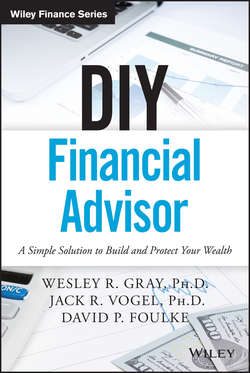Читать книгу DIY Financial Advisor - Vogel Jack R. - Страница 5
На сайте Литреса книга снята с продажи.
Preface
ОглавлениеThis book is a synopsis of our research findings developed while serving as a consultant and asset manager for large family offices. By way of background, a family office is a company, or group of people, who manage the wealth a family has gained over generations. The term family office has an element of cachet, and even mystique, because it is usually associated with the mega-wealthy. However, practically speaking, virtually any family that manages its investments – independent of the size of the investment pool – could be considered a family office. The difference is mainly semantic. For example, the term individual investor is often a reference to the head of a household who manages a family's assets. This “individual investor” is a de facto family office – no matter whether this individual investor manages a $10,000 portfolio or a $5,000,000,000 portfolio. The goal is the same as for even the largest family office.
There are benefits and costs to being a family office. The key advantage a family office or, by extension, any individual investor, has over so-called “institutional” investors, is the ability to make long-term investment decisions that maximize after-tax, after-fee risk-adjusted performance, without fear of a misalignment of incentives – those who own the money are the best stewards of the money. By contrast, a professional institutional investor, or “hired gun,” is crippled by a misalignment between the incentives of the owners of capital and those of the investment manager, who has a separate incentive to keep his job, which can create a shorter-term perspective that can conflict with a long-term perspective. The decision that maximizes the after-fee, after-tax, risk-adjusted returns on capital, while optimal for the owner of capital, is not always the optimal decision for a third-party investment manager.
The key disadvantages for a family office, or an individual investor, relative to an institutional investor, are the effect of taxes and a knowledge gap that is sometimes more closely related to perception than reality. But fear not; this book is meant to fill the knowledge gap by providing the reader with the tools to be successful and the confidence to minimize the use of “experts.” And taxes, while challenging, can be minimized by limiting trading activity, engaging in smart planning, and by following some of the simple rules we outline in this book.
Perhaps you are skeptical that you can manage your own wealth. After all, legions of wealth managers have probably told you repeatedly that you cannot. We are here to tell you that you can. We have been lucky to work with and learn from some superb family offices, and the people that run their organizations. The main finding from our experience is that complexity does not imply value – especially when talking about investments.
Many less wealthy investors are told that the mega-rich benefit from their access to arcane strategies, hedge funds, and private equity investments. We are here to tell you that this popular and widespread meme has been propagated by salesmen, not by evidence: access to overpriced, opaque, complex, tax-inefficient exposures typically managed by egomaniacs is not an advantage – it is a serious disadvantage!
What matters in investing are avoiding psychology traps and sticking to the FACTS (fees, access, complexity, taxes, and search), a framework we describe in Chapter 5. These simple concepts apply to everyone, not just the ultra-wealthy. The findings of this book are therefore applicable to the middle-class as well as to the mega-rich. Attempting to maintain and grow wealth accumulated over a lifetime is a task that is equally daunting for both individuals and for big name family offices.
Our natural inclination is to succumb to the challenge of portfolio management and let an “expert” deal with the problem. For a variety of reasons we discuss in this book, we should resist this urge to go with our gut instinct. We suggest that investors maintain direct control, or at least a thorough understanding, of how their hard-earned wealth is managed.
Our book is meant to be an educational journey that slowly builds confidence in one's own ability to manage a portfolio. In our book, we explore a potential solution that can be applicable to a wide-variety of investors, from the ultra-high-net-worth to middle-class individual, all of whom are focused on similar goals of preserving and growing their capital over time.
